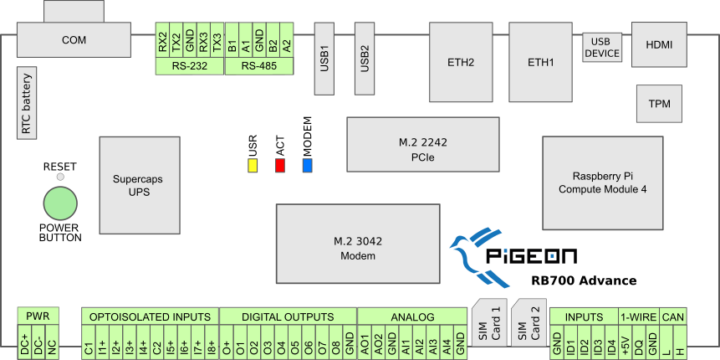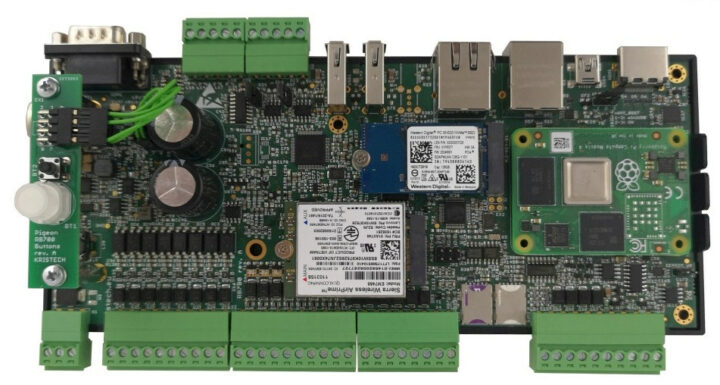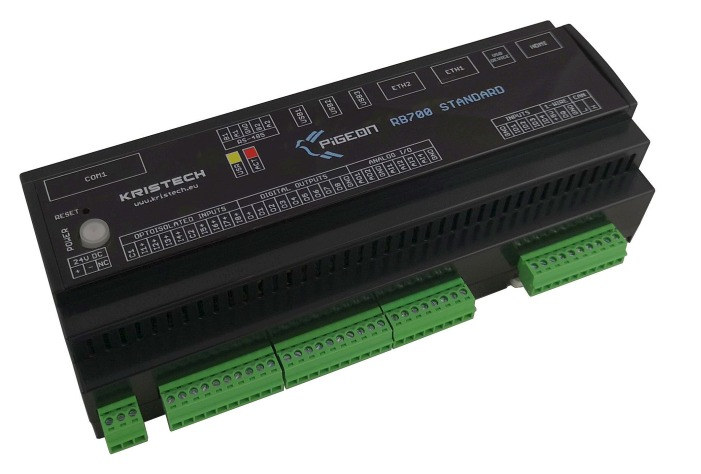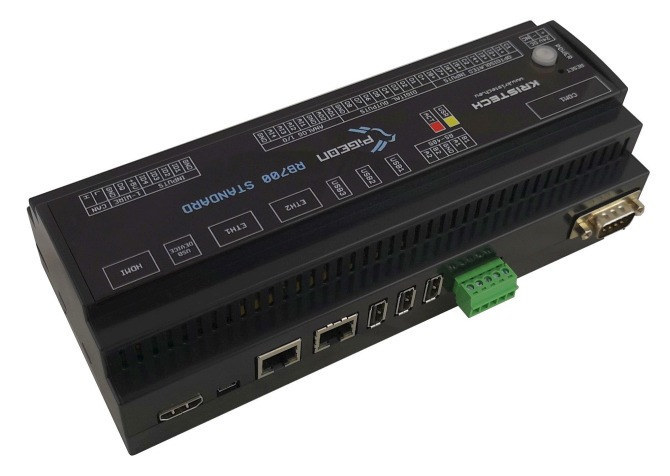We’re covered DIN-Rail industrial computers powered by Raspberry Pi CM4 module, but Kristech’s Pigeon RB700 automation controller may be the one with the most features so far thanks to two RS-485 ports, two Ethernet ports, CAN FD, 1-WIRE, RS-232, 12 digital inputs (8 optoisolated, 4 dry contacts), and 8 digital outputs.
That’s for the common features present in all variants including RB700 Essense. The RB700 Standard model adds UPS, HDMI, analog I/Os, and TPM, while the RB700 Advance is further equipped with two M.2 sockets (for SSD and/or cellular modem) and two additional RS-232 ports.
- Supported SoM- Raspberry Pi CM4 with up to 8GB RAM, up to 32GB flash, optional WiFi 5 and Bluetooth 5.0 module
- Video Output (Standard and Advance) – HDMI port
- Networking – 2x Ethernet ports
- USB – 2x or 3x USB 2.0 ports
- Wired communication interfaces
- 3x RS-232, 2x RS-485, CAN FD, 1-Wire
- Advance only – 2x extra RS-232 interfaces
- I/Os
- 8x digital opto-isolated inputs (Low-level input voltage 0 … +5 V DC; High-level input voltage +10 … +28V DC)
- 4x dry contact inputs
- 8x open-drain outputs
- Standard and Advance
- 4x Analog inputs (0-10V)
- 2x Analog outputs (0-10V)
- Expansion (Advance only)
- M.2 2242 PCIe socket for SSD
- M.2 3042 socket for cellular modem + 2x SIM card slots
- Misc
- Real Time Clock with battery backup
- Meets requirements of EN IEC 61326-1:2021 for basic and industrial electromagnetic environments
- 2x watchdogs
- Standard and Advance – TPM 2.0
- Power Supply
- 24V DC (20 … 32V) via 3-pin terminal block
- Standard and Advance – Supercapacitor based UPS (battery-free)
- DIN rail enclosure with optional wall mount
- Dimensions – 212 x 114 x 59 mm (including terminal blocks connectors)
- Weight
- Essence – 306 grams
- Standard – 351 grams
- Advance – 358 grams

The company provides a lightweight Linux distribution based on the official Raspberry Pi OS (Lite?) plus the code/drivers to handle the extra interfaces. Kristech also says the system supports “open-source and commercial software for automation and control systems” such as the company’s PigeonTool, as well as openHAB, Domoticz, PiDome, CODESYS, and REX Control System.
You’ll find what appears decent hardware and software documentation on the company’s website, as well as code samples in C, Python, and Bash on Github, some of which are several years old and designed for their earlier Raspberry Pi CM3 models.

Poland-based Kristech did not provide pricing for their industrial controllers. More details may be found in the announcement and products pages.
Via LinuxGizmos

Jean-Luc started CNX Software in 2010 as a part-time endeavor, before quitting his job as a software engineering manager, and starting to write daily news, and reviews full time later in 2011.
Support CNX Software! Donate via cryptocurrencies, become a Patron on Patreon, or purchase goods on Amazon or Aliexpress






